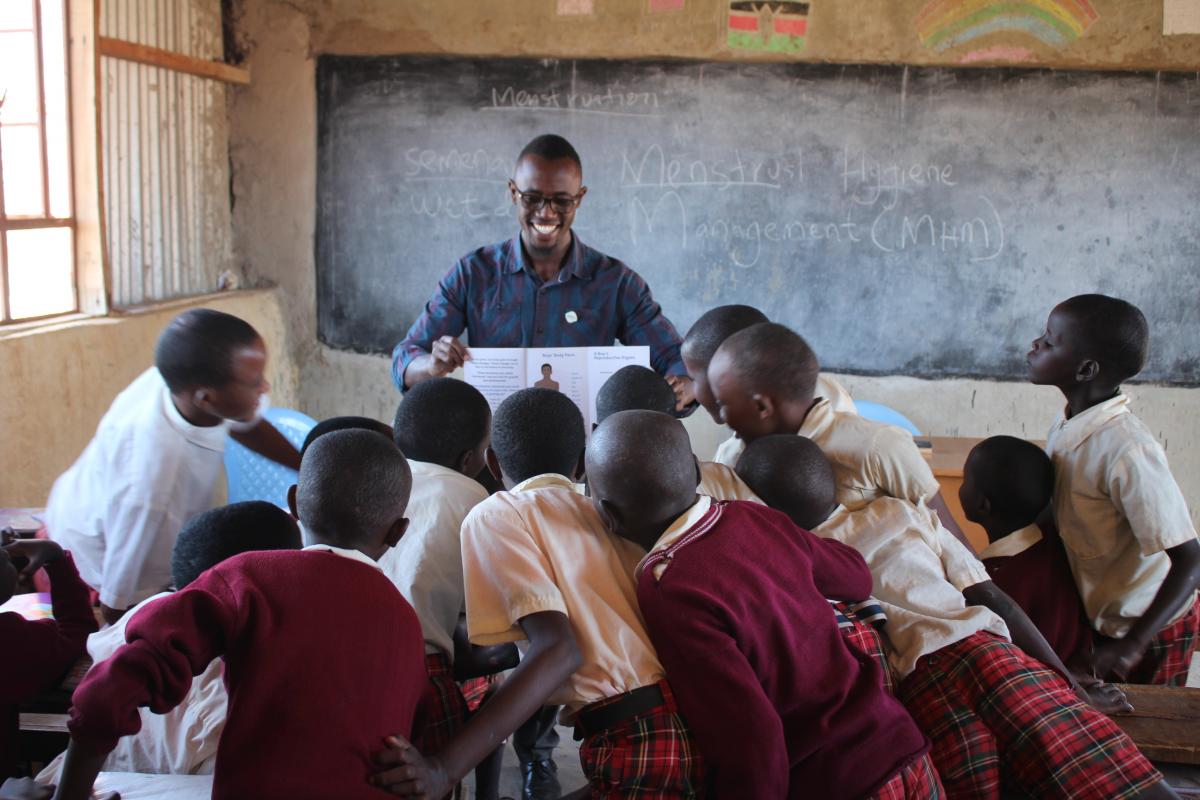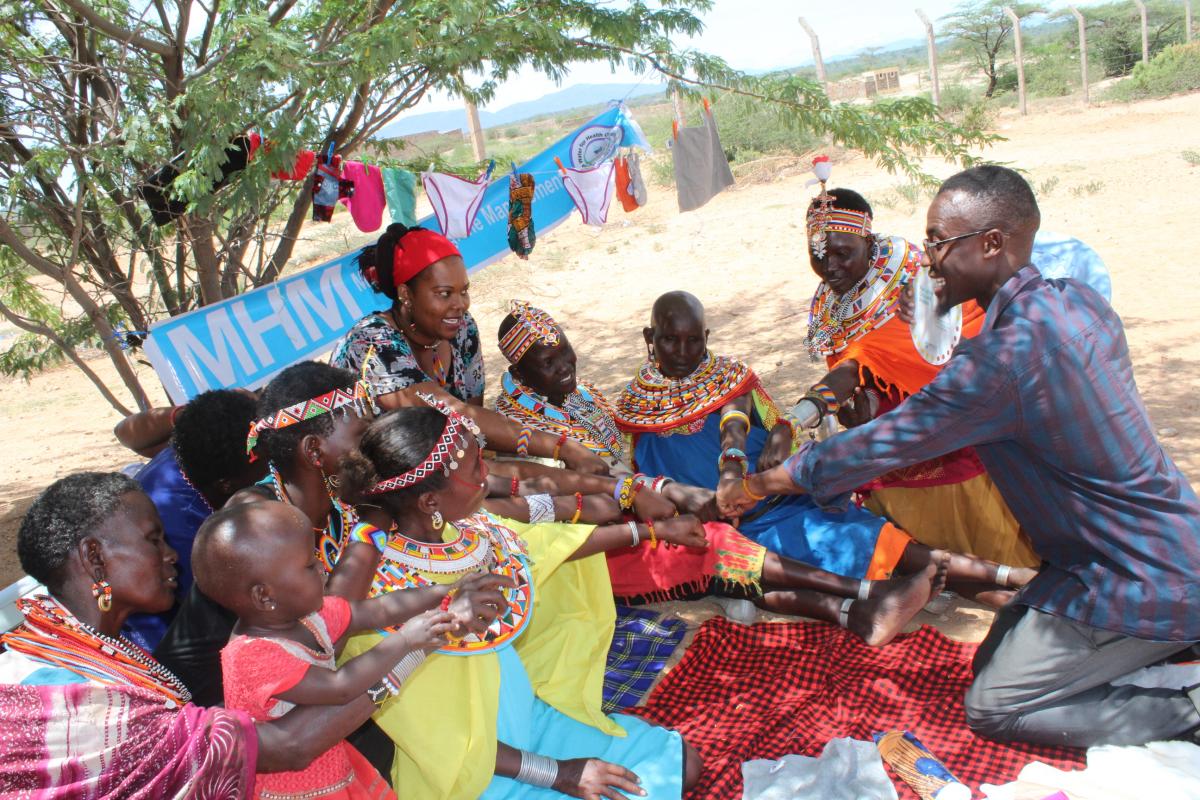Guest blog by Kenyan menstrual hygiene management champion Daniel Karanja.
Published on: 17/06/2019
“A man going on national Kenyan TV and talking about menstrual hygiene in such a clear, normalising way is awesome.” These are the words of Ton Schouten Award selection committee member, Sean Furey about Daniel Karanja. Even though we could only choose one winner, we do not let that stop us from sharing stories of the talented people we were introduced to during this year`s award process. Daniel Karanja has made raising awareness and involving men in menstrual hygiene management (MHM) his goal. In his blog, he reflects on MHM in Kenya and shares some of his personal experiences.

Silence on menstruation, taboos, beliefs and myths constitute a denial of freedom for women and girls. So let`s talk menstruation. It lasts between 2-7 days after every 21-35 days and brings with it a set of vulnerabilities. Hence the need for support to women and girls during this time of the month. Support that might last about 37 years and is needed approximately 500 times - the amount of times she will have periods in her lifetime. The Kenyan approach to menstrual hygiene management is three pronged, namely; breaking the silence on menstruation, managing menstruation hygienically and safe reuse and/or disposal solutions. Therefore, menstrual hygiene management requires that women and adolescent girls are able to use clean menstrual management material. One should be able to change the material in privacy as often as necessary for the duration of a menstrual period, using soap and water for washing the body as required, and having access to safe and convenient facilities to dispose of used menstrual management materials. Further, they ought to understand the basic facts linked to the menstrual cycle and how to manage it with dignity and without discomfort or fear (JMP Hygiene working group 2012).
Experiences differ from one person to another. While some women and girls have severe abdominal cramps, or are extremely moody, others experience no major limitations during their period.
Even with differences in the conditions brought about by hormonal imbalance, the situation is exacerbated where individuals lack management options, compelling them to use crude methods and materials. More often than not, these materials promote undignified management, fear, shame and exposure to not only the risk of infection, but also punctured self-esteem. Lack of accessibility, availability, and affordability of quality and appropriate management materials for school going girls, results in missed school class sessions, thus an uneven and unhealthy ground for academic competition with their male counterparts. To a greater extent, especially for girls in remote rural and low income urban settings in Kenya, lack of education on menstruation and menstrual hygiene management can lead to negative consequences. In some cases, girls are sexually exploited in exchange for sanitary products.
So eventually the lack of menstruation management materials can lead to; increased rate of school drop outs, teenage pregnancy and/or Sexually Transmitted Infections (STIs) including HIV only to mention a few. Because of this, women are forced to compromise on quality and productivity, losing human resource and labour hours, key elements for economic growth and prosperity.
According to a situation analysis carried out by the Ministry of Health in Kenya (2016), 46% of the respondents used disposable pads, with only 6% using reusable pads and 7% relying on old cloths, pieces of blanket, chicken feathers, mud and even newspapers. This reminds me of a case I encountered in Elgeyo Marakwet County in 2018 during celebrations to mark the Day of the African Child 2018 in one of the rural primary schools. Girls were excited to receive a pack of reusable sanitary pads, “I will be able to attend all school days without having to fear about the cloths I was using falling out and embarrass me,” says Chelimo, a grade 7 pupil. “These pads have wings to lock it in place, I hope to fly higher in my education using those wings,” she quips.
54% of Kenyan girls reported challenges with access to MHM products, with 22% of school-going girls indicating that they purchased their own sanitary products. In Sebit Ward rural West Pokot County, I encountered a group of girls who were quick to note that access to sanitary pads was a challenge because not all shops stock these products. One was forced to wait until the weekly market day to purchase them, hopefully still having enough money to buy for subsequent periods.

Menstrual health management is an important aspect of reproductive health. If not handled appropriately menstruation can cause infections of the urinary tract and pelvic inflammatory diseases and other serious illnesses. On top of that bad odour, soiled garments and shame, ultimately lead to infringement of the girls’ dignity (Oche, Umar, Gana & Ango, 2012).
There is a need for more research to understand the impact of MHM programmes on life outcomes. Lack of alignment between diverse stakeholders and sector silos hinders progress on menstrual health. Immediate opportunities exist to better support adolescent girls in Kenya, including improved access to timely menstruation and puberty education, improved product access and affordability for low income consumers, integration of girl-friendly features into sanitation design and infrastructure, and political advocacy for improved MHM at the sub national and national level. Indeed, it’s time for action to leave no one behind on all things menstruation around the world. And we all have a role to play.
At IRC we have strong opinions and we value honest and frank discussion, so you won't be surprised to hear that not all the opinions on this site represent our official policy.